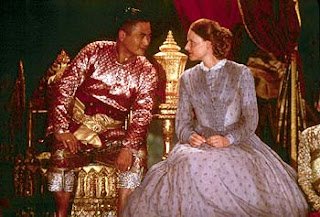The following post is part of a series on Jodie Foster specifically, and Hollywood actors generally, as historians.
The overlooked gem in Foster’s career is Anna and the King. Like Last of the Mohicans, this is story rooted in fact that has gone through many iterations over the course of the last century. Its source material is the two-volume memoir of Anna Harriet Leonowens, a Victorian widow who worked as a tutor in the court of the King of Siam in the 1860s, just as British imperial power was reaching its zenith. The accuracy of the portrait that emerges of the reform-minded Siamese ruler, Mongkut, in The English Governess at the Siamese Court (1870-73), has been contested, and is in any case filtered through an elite variety of western feminism. Incidents in Leonowens story received a new lease on life in 1944, when children’s author Margaret Langdon published Anna and the King, which became an evergreen novel of its genre (it was reissued in 2000 and remains in print). The novel, in turn, spawned a 1946 movie starring Rex Harrison (ouch!) as the King and Irene Dunne as Leonowens. The novel also led to the 1951 stage production The King and I, which in turn became the basis of 1956 Rogers and Hammerstein musical The King and I with Yul Brenner and Deborah Kerr in the lead roles. This musical has long been regarded as one of the most beloved works from Broadway’s Golden Age, but like its predecessors is marked by racism that can be truly embarrassing to watch, as in the long minstrel show sequence featuring “Asian” figures in blackface.
Given this benighted Orientalist history, it’s a bit surprising that anyone would want to approach this material again, and while director Andy Tennant expressed dismay about the difficulty he encountered with the Thai government in shooting the film (most of which ended up being shot in Malaysia) he should hardly have been surprised that his motives would be questioned. But his 1999 version of the story, which is more beautifully designed than any of its predecessors, recalibrates the scales in important respects. Perhaps the most important is the casting Chinese actor Chow Yun-Fat as Mongkut to go along with Foster’s Anna, which he endows with an incisive dignity sorely missing from previous versions. He and Foster have very good chemistry; their evident intelligence is a source of mutual respect and attraction, even as they banter and disagree on matters of style as well as substance. In Rogers and Hammerstein’s King and I there are references to Harriet Beecher Stowe and Abraham Lincoln – perhaps inevitable, given the American production and audience for the story – but in this one Mongkut cherishes a letter from President Lincoln, who has politely declined the King’s assistance in the Union cause, and the monarch speaks with accuracy and clarity about the meaning of the Battle of Antietam, which takes place simultaneously with the story.
Anna and the King also recalibrates the gender politics. At one point, the passionate Anna intervenes to prevent the caning of one of the King’s concubines, who is caught while running from court to a Buddhist monastery to join her true love. While we the viewers and even the King understand the merits of Anna’s advocacy on their behalf, it is not only politically naïve, but counterproductive, effectively leaving him no choice but to execute the two lest he damage his credibility at a critical moment in the life of his regime.
Which represents one more layer of complexity in this telling of the story. Though substantially fictionalized, the movie depicts Mongkut has having to navigate complex political currents that include the imperial jockeying of Britain and France (a well as intra-imperial British tensions) and a coup attempt being mounted by his own brother. Specific details aside, the message here is consistent with the core of Foster’s acting choices going back decades: destructive external forces are always lurking, ready to destroy the most promising of aspirations, whether those of a Great Emancipator of the West or one in the East. It is these political forces – of greed encased in a thin veneer of ideologies that include, but are not limited to, avowed racism – that become the primary barrier to peaceful unions, romantic and otherwise, in this Anna and the King. But all is not lost: the King’s son, sustained by the memory of his father’s unique relationship with a woman as an equal, will fulfill and extend his plans to bring his nation into the modern world.
Next: Foster's foray into flawed characters.
